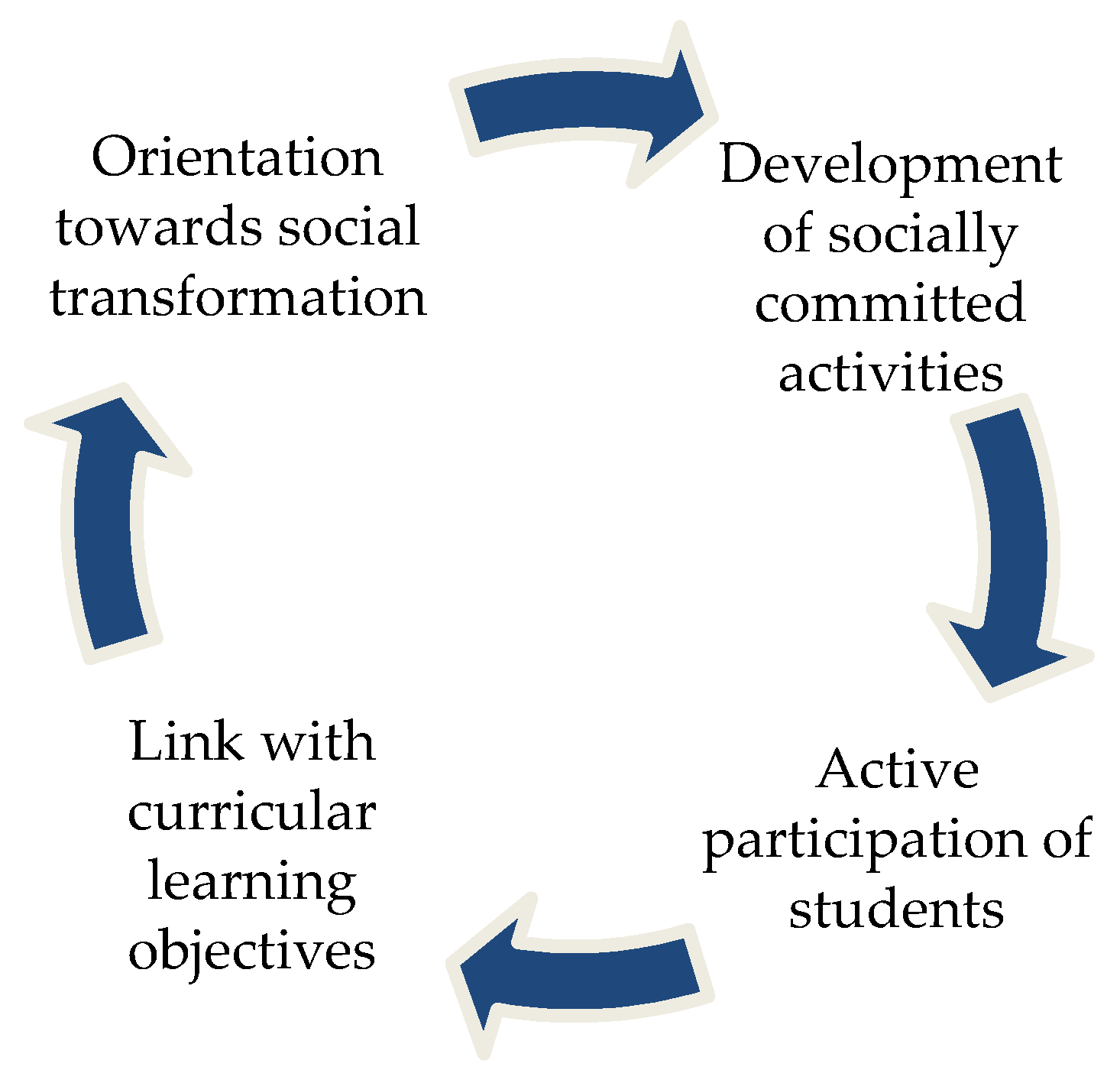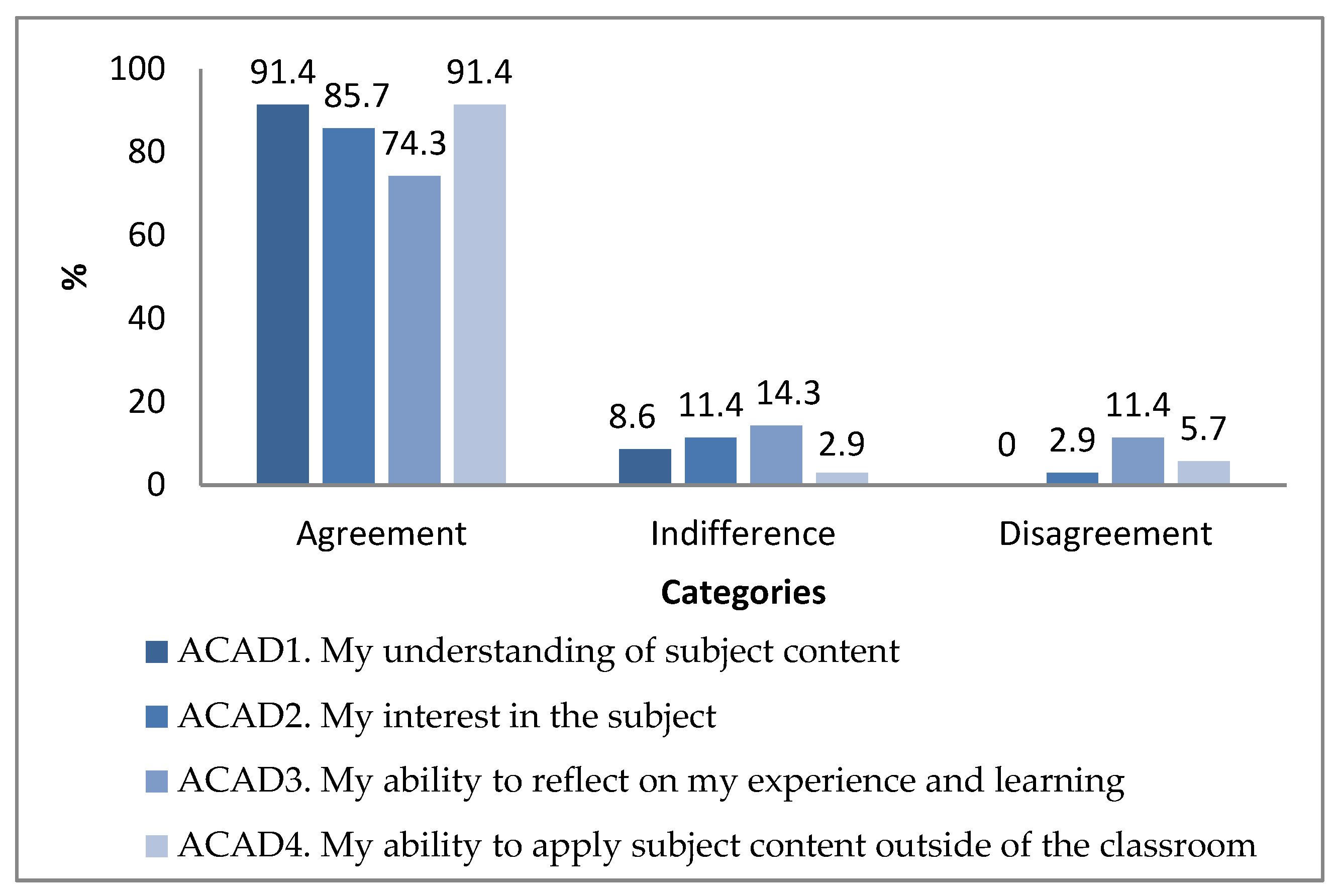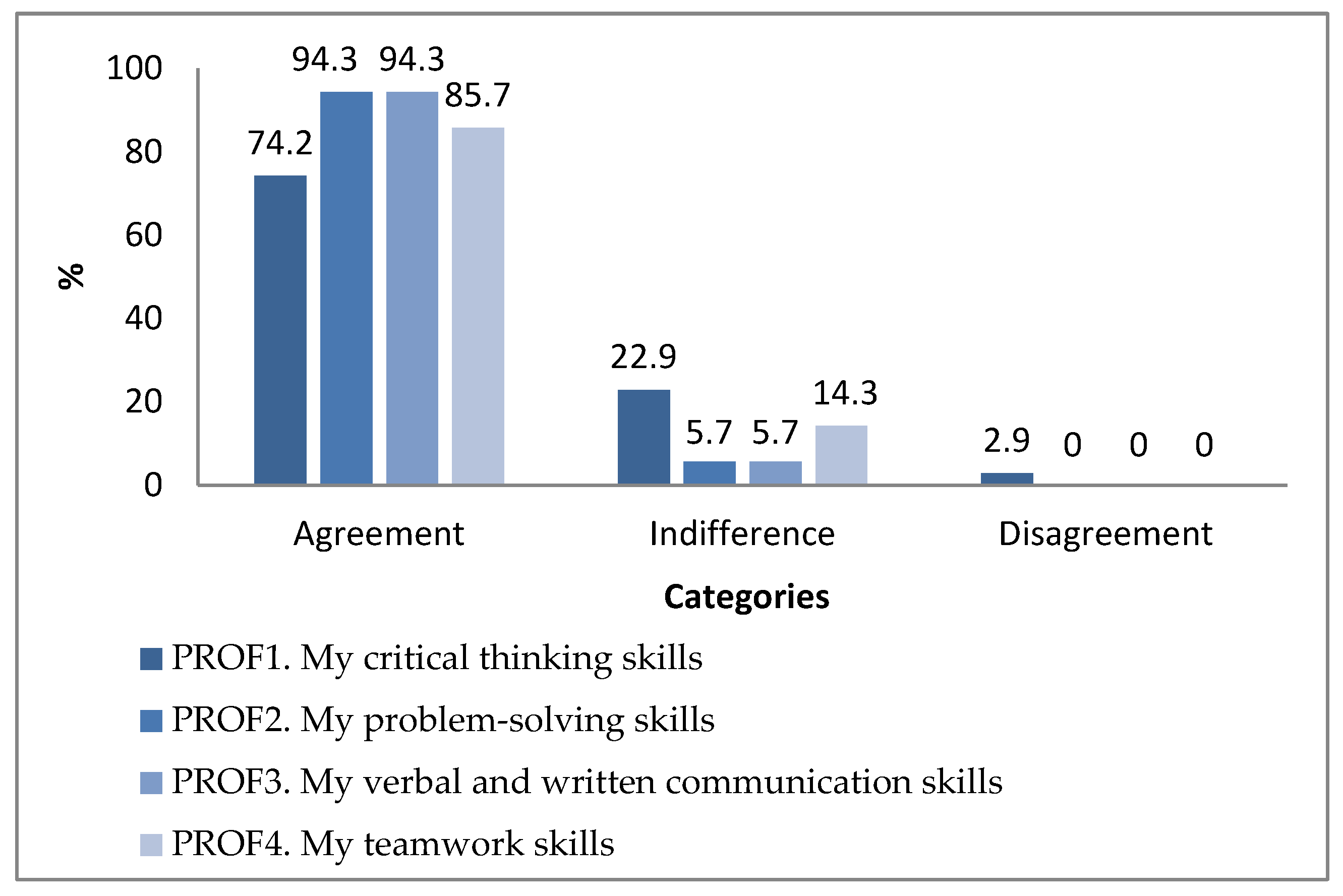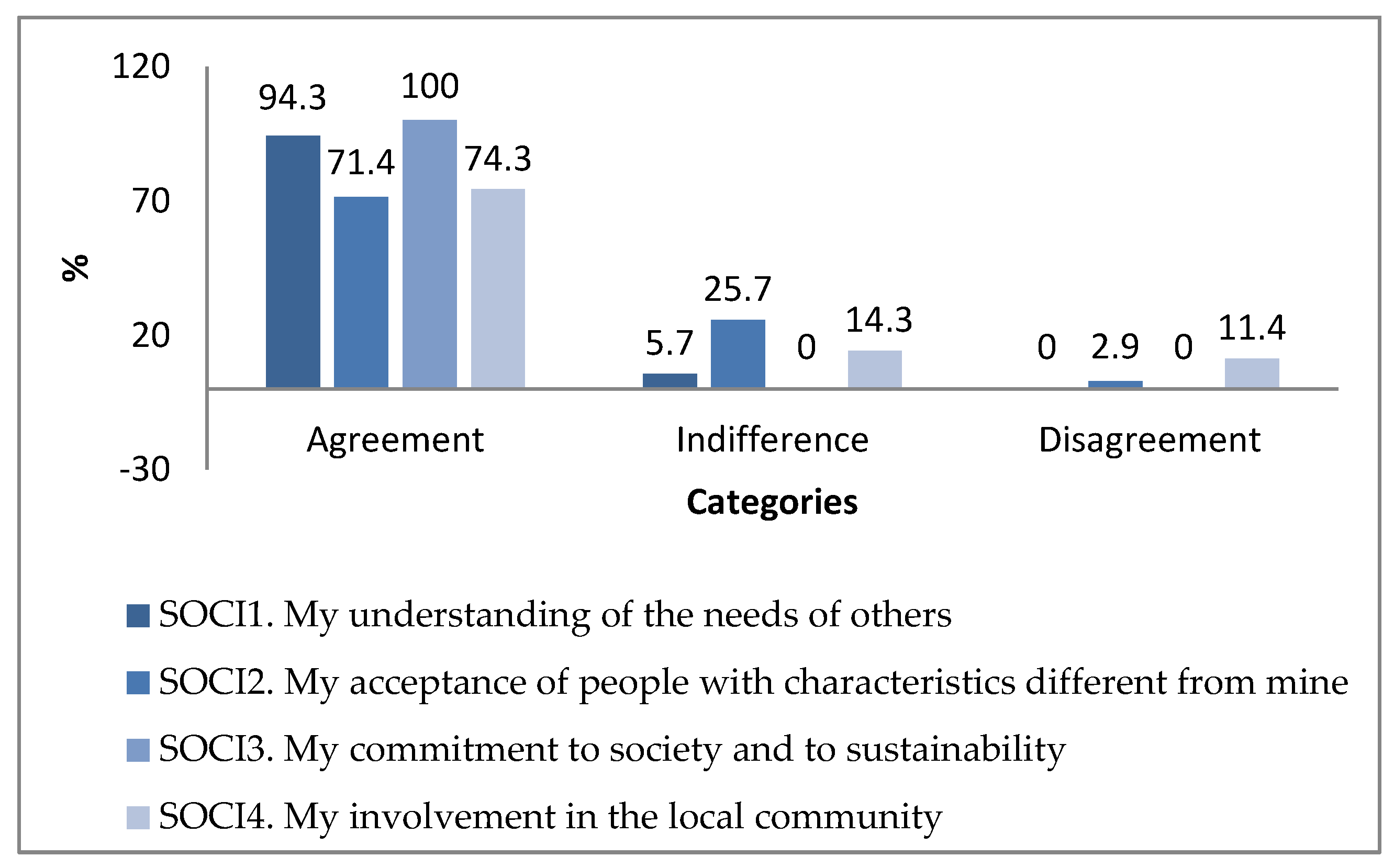Service-Learning for Sustainability Entrepreneurship in Rural Areas: What Is Its Global Impact on Business University Students?
Abstract
:1. Introduction
2. Theoretical Framework
2.1. University SL
2.2. University SL in the Fields of Business Administration and Entrepreneurship
2.3. University SL for Sustainability Entrepreneurship: A Proposal for Rural Development
3. Materials and Methods
3.1. University Context
- Fundamentals of Business Administration (1st year of the Bachelor’s degree in Business Administration and Management)
- International Accounting Standards (2nd year of the Bachelor’s degree in International Commerce)
- International Financial Markets (3rd year of the Bachelor’s degree in Finance)
- Fundamentals of Business Administration/Marketing (2nd year of the Bachelor’s degree in Electrical Engineering)
- Organisation of Industrial Enterprise (2nd year of the Master’s degree in Industrial Engineering)
3.2. Samples
3.3. Procedure
- In the first stage of planning, the service to be provided to society and the context of the activity were determined. For this purpose, we first contacted various town councils in the province of León (Spain), all of them in rural municipalities with no entrepreneurial support service. Subsequently, once the number of local public institutions willing to collaborate in the SL project and the number of workshops agreed with them were known, both the experimental group and the control group were selected.
- During the second stage of implementation, first there was an initial group work activity with the seven students from each subject, under the guidance of the corresponding teacher, to obtain a deeper knowledge of the curricular content related to the specific section of the Business Plan linked to that subject (Administration, Accounting, Finance, Marketing or Operations Management). Then, seven multi-disciplinary groups were set up, each with five students, one from each subject. Therefore, all teams addressed the five main sections of any Business Plan, and the workshops given by them covered the full Business Plan. Subsequently, under the supervision of a teacher, each multi-disciplinary group prepared and gave a free workshop to unemployed people and potential entrepreneurs with business projects for local sustainability.Among these projects, it must be highlighted that there were some related to activities of ecological agriculture and livestock, green tourism, sustainable handicraft production (for example, manufacture of jewels using recycling plastics, manufacture of dolls with textile scraps, manufacture of home accessories using wild plants, forages and fallen tree leaves, etc.) or the provision of specific services for groups at risk of social exclusion (for example, sick or disabled people, elderly people, unemployed recent graduates, etc.). All these business projects were aimed at promoting the sustainable development of rural municipalities where potential entrepreneurs lived, fostering the creation of employment opportunities, which contributes to the reduction of the poverty and depopulation of these disadvantaged areas, and stimulating their social and ecological sustainability. The workshops given by the service-students covered both the most relevant theoretical aspects for drawing up a successful Business Plan and a practical application based on a study of the economic, social and environmental viability of a new firm to be set up in that rural area, and they ended with an interaction between students and potential entrepreneurs, which proved to be very useful for both participants since the former used the knowledge learned in class to solve the doubts raised by the latter regarding the development of the Business Plans for their sustainable rural development projects.
- During the final stage of evaluation, three self-evaluation questionnaires were designed so that each group involved in the SL project for Sustainability Entrepreneurship—students, teachers and potential entrepreneurs—could assess their own perception of the impact of SL once the experience ended. For this purpose, a Likert-type scale was built with five response options and different items for each of the groups participating. To draw conclusions from our SL experience, two types of statistical analyses were developed: (a) one of a qualitative nature, to know the self-perception of the various groups involved in the activity from their responses to the questionnaires, although this article reports only the results regarding the group of participating students; and, (b) another of a quantitative nature, to determine if there were any statistically significant differences in the academic performance of the students who participated compared to those who did not. Statistical data processing was performed on the software SPSS for Windows, version 25.0 (SPSS Inc., Chicago, IL, USA).
3.4. Instruments and Variables
- Improvement in curricular development: SL allows for raising the quality of the teaching-learning process in each subject because the theoretical contents studied in the classroom take on their full meaning when put into practice.
- Improvement in professional skills: SL allows the reorientation of learning towards the acquisition of the crosscutting skills that are in increasing demand from society for business sector professionals, such as team working, speaking in public, performing critical analyses, solving real problems in society, leading a group, etc.
- Improvement in civic and social responsibility: SL allows for increasing the commitment towards society, solidarity and sustainability.
- Initial academic performance (pre-test): measured by the marks obtained by the students in the first exam (between 0 and 10 points), which was performed when the SL experience was being planned, thus, a little before it began.
- Final academic performance (post-test): measured by the marks for the second exam (between 0 and 10 points), which was held after SL was over.
4. Results
4.1. Impact of SL on Curricular Development, Professional Skills, and Civic and Social Responsibility
4.2. Impact of SL on Academic Performance
5. Discussion and Conclusions
- At a civic and social level, the workshops given free of charge to unemployed people and potential entrepreneurs from rural areas mainly increased the commitment of students towards society and sustainability, as well as their awareness and understanding of the needs of others. These benefits of SL were also found in some prior studies [1,9,35]. Specifically, this potential to contribute to the civic and social development of students makes it possible to distinguish SL from other experiential and transformative learning methodologies such as PBL [27], CBL [28] or DT [29].
- At a professional level, the interaction among the three groups involved in the SL experience—students, teachers and entrepreneurs—allowed the former to acquire important skills for finding their way in today’s business world, which are difficult to achieve using other teaching methods. As in some previous studies [10,33,34], we found evidence that students place special value on the impact of SL on their improved ability to both solve problems and communicate orally and in writing.
- At a curricular level, the service-students acknowledged that, by responding to social demands from the potential entrepreneurs who attended the workshops, they learnt the content of the subjects in a practical and experiential way, improving their understanding of it and their capacity for applying it outside of classroom. Therefore, as in previous research, our findings showed that SL positively influences the learning and application of the theoretical contents taught during the course [8,32].
- According to the results of “intra-group” comparative analyses, it can be concluded that our SL project for Sustainability Entrepreneurship had a favourable effect on the evolution of academic performance in the group of service-students. Specifically, their average mark was higher in the second exam, which was held after participation in SL, than in the first, which was carried out when the SL experience was being planned and thus had not yet begun, although the difference observed is not statistically significant. However, the academic performance of non-participating students decreased significantly between the start and the end of the SL project in which they did not participate. Our results are therefore in line with those of other authors [32,33]. Moreover, although the positive influence of participation in SL on the progress made by service-students’ academic performance was small, the magnitude of the negative effect of not participating in it seems be large.
- After an “inter-group” comparative analysis, our results show the effectiveness of SL for achieving academic success to the extent that the service-students gained average marks in the second exam that were significantly higher than those obtained by the non-participating students. Therefore, these findings coincide with those reported in previous research [36,37,38]. In addition, the size of the positive impact of SL on the difference in final academic performance between both groups was large. It can therefore be concluded that the dissimilarity observed in academic success between participating and non-participating students is not random and can be attributed to the involvement in the SL project for Sustainability Entrepreneurship and not to external factors.
5.1. Implications
5.2. Limitations and Future Research Lines
Author Contributions
Funding
Conflicts of Interest
Appendix A
| Participation in the SL project has improved… |
|---|
| Curricular development |
| ACAD1. My understanding of subject content |
| ACAD2. My interest in the subject |
| ACAD3. My ability to reflect on my experience and learning |
| ACAD4. My ability to apply subject content outside of the classroom |
| Professional skills |
| PROF1. My critical thinking skills |
| PROF2. My problem-solving skills |
| PROF3. My verbal and written communication skills |
| PROF4. My teamwork skills |
| Civic and social responsibility |
| SOCI1. My understanding of the needs of others |
| SOCI2. My acceptance of people with characteristics different from mine |
| SOCI3. My commitment to society and to sustainability |
| SOCI4. My involvement in the local community |
References
- Cabedo, L.; Royo, M.; Moliner, M.L.; Guraya, T. University social responsibility towards engineering undergraduates: The effect of methodology on a service-learning experience. Sustainability 2018, 6, 1823. [Google Scholar] [CrossRef]
- Lozano, R.; Merril, M.Y.; Sammalisto, K.; Ceulemans, K.; Lozano, J.F. Connecting competences and pedagogical approaches for sustainable development in Higher Education: A literature review and framework proposal. Sustainability 2017, 9, 1889. [Google Scholar] [CrossRef]
- Soria, K.M.; Mitchell, T.D. Community service and social justice at research universities. In Educating for Citizenship and Social Justice; Mitchell, T.D., Soria, K.M., Eds.; Palgrave Macmillan: London, UK, 2018; pp. 239–259. [Google Scholar]
- Ruth, A.; Hackman, J.; Brewis, A.; Spence, T.; Luchmun, R.; Velez, J.; Ganesh, T.G. Engineering Projects in Community Service (EPICS) in High Schools: Subtle but potentially important student gains detected from human-centered curriculum design. Educ. Sci. 2019, 9, 35. [Google Scholar] [CrossRef]
- Yorio, P.L.; Ye, F. A meta-analysis on the effects of service-learning on the social, personal and cognitive outcomes of learning. Acad. Manag. Learn. Educ. 2012, 11, 9–27. [Google Scholar] [CrossRef]
- Ngai, G.; Lam, C.H.Y.; Kwan, K.; Chan, S.C.F. Instituting a Service-Learning requirement in Higher Education: Evaluation and lessons learned. In Service-Learning for Youth Leadership; Shek, T.L., Ngai, G., Chan, S.C.F., Eds.; Springer: Singapore, 2019; pp. 323–341. [Google Scholar]
- Andrews, P.G.; Leonard, S.Y. Reflect, Analyze, Act, Repeat: Creating critical consciousness through critical Service-Learning at a Professional Development School. Educ. Sci. 2018, 8, 148. [Google Scholar] [CrossRef]
- Hébert, A.; Hauf, P. Student learning through service-learning: Effects on academic development, civic responsibility, interpersonal skills and practical skills. Act. Learn. High. Educ. 2015, 16, 37–49. [Google Scholar] [CrossRef]
- Caspersz, D.; Olaru, D. The value of service-learning: The student perspective. Stud. High. Educ. 2017, 42, 685–700. [Google Scholar] [CrossRef]
- Gerholz, K.H.; Liszt, V.; Klingsieck, K.B. Effects of learning design patterns in service learning courses. Act. Learn. High. Educ. 2018, 19, 47–59. [Google Scholar] [CrossRef]
- Akrivou, K.; Bradbury-Huang, H. Educating integrating catalysts: Transforming business schools toward ethics and sustainability. Act. Learn. High. Educ. 2015, 14, 222–240. [Google Scholar]
- Wang, L.; Calvano, L. Understanding how service learning pedagogy impacts student learning objectives. J. Educ. Bus. 2018, 93, 204–212. [Google Scholar] [CrossRef]
- Halberstadt, J.; Schank, C.; Euler, M.; Harms, R. Learning sustainability entrepreneurship by doing: Providing a lecturer-oriented service learning framework. Sustainability 2019, 11, 1217. [Google Scholar] [CrossRef]
- Guitián, G. Service as a bridge between ethical principles and business practice: A catholic social teaching perspective. J. Bus. Ethics 2015, 128, 59–72. [Google Scholar] [CrossRef]
- Nikolova, N.; Andersen, L. Creating shared value through Service-Learning in Management Education. J. Manag. Educ. 2017, 41, 750–780. [Google Scholar] [CrossRef]
- Kenworthy-U’ren, A.; Peterson, T. Service-Learning and Management Education: Introducing the “WE CARE” approach. Acad. Manag. Learn. Educ. 2005, 4, 272–277. [Google Scholar] [CrossRef]
- Arora, P. Shaping managerial values: Incorporating experiential learning in Management Education. In Meeting Expectations in Management Education; Christopher, E., Ed.; Palgrave Macmillan: London, UK, 2018; pp. 201–216. [Google Scholar]
- McCrea, E.A. Integrating Service-Learning into an introduction to Entrepreneurship course. J. Manag. Educ. 2010, 34, 39–61. [Google Scholar] [CrossRef]
- Colakoglu, S.N.; Sledge, S.A. The development of critical thinking skills through a Service-Learning oriented Entrepreneurship course. J. Entrep. Educ. 2013, 16, 115–124. [Google Scholar]
- Rutti, R.M.; LaBonte, J.; Helms, M.M.; Hervani, A.A.; Sarkarat, S. The Service Learning projects: Stakeholder benefits and potential class topics. Educ. Train. 2016, 58, 422–438. [Google Scholar] [CrossRef]
- Huggins, R.; Thompson, P. Entrepreneurship, innovation and regional growth: A network theory. Small Bus. Econ. 2015, 45, 103–128. [Google Scholar] [CrossRef]
- Urbano, D.; Aparicio, S.; Audretsch, D. Twenty-five years of research on institutions, entrepreneurship, and economic growth: What has been learned? Small Bus. Econ. 2019, 53, 21–49. [Google Scholar] [CrossRef]
- Korsgaard, S.; Müller, S.; Tanvig, H.W. Rural entrepreneurship or entrepreneurship in the rural—between place and space. Int. J. Entrep. Behav. Res. 2015, 21, 5–26. [Google Scholar] [CrossRef]
- De Los Ríos-Carmenado, I.; Ortuño, M.; Rivera, M. Private–public partnership as a tool to promote entrepreneurship for sustainable development: WWP Torrearte Experience. Sustainability 2016, 8, 199. [Google Scholar] [CrossRef]
- Jones, A.L.; Warner, B.; Kiser, P.M. Service-Learning & Social Entrepreneurship: Finding the common ground. Partnerships 2010, 1, 1–15. [Google Scholar]
- Rama, D.V.; Ravenscroft, S.P.; Wolcott, S.K.; Zlotkowski, E. Service-Learning outcomes: Guidelines for educators and researchers. Issues Acc. Educ. 2000, 15, 657–692. [Google Scholar] [CrossRef]
- Deeley, S. Critical Perspectives on Service-Learning in Higher Education; Palgrave Macmillan: London, UK, 2015; ISBN 978-1-137-38325-9. [Google Scholar]
- Duarte, J.; Nogueira, J.R. From the hidden protest of students towards problem-based learning. Educ. Sci. 2019, 9, 215. [Google Scholar] [CrossRef]
- Apple, Inc. Challenge Based Learning: A Classroom Guide. 2011. Available online: https://images.apple.com/education/docs/CBL_Classroom_Guide_Jan_2011.pdf (accessed on 3 September 2019).
- Daniel, A.D. Fostering an entrepreneurial mind-set by using a design thinking approach in Entrepreneurship Education. Ind. High. Educ. 2016, 30, 215–223. [Google Scholar] [CrossRef]
- Eyler, J.; Giles, D. Where’s the Learning in Service Learning? Jossey-Bass: San Francisco, CA, USA, 1999; ISBN 0470907460. [Google Scholar]
- Simons, L.; Cleary, B. Student and community perceptions of the “value added” for service-learners. J. Exp. Educ. 2005, 28, 164–188. [Google Scholar] [CrossRef]
- Levesque-Bristol, C.; Knapp, T.D.; Fisher, B.F. The effectiveness of service-learning: it’s not always what you think. J. Exp. Educ. 2010, 33, 208–224. [Google Scholar] [CrossRef]
- Prentice, M.; Robinson, G. Improving Student Learning Outcomes with Service-Learning; American Association of Community Colleges: Washington, DC, USA, 2010; pp. 1–16. [Google Scholar]
- Celio, C.I.; Durlak, J.; Dymnicki, A. A meta-analysis of the impact of Service-Learning on students. J. Exp. Educ. 2011, 34, 164–181. [Google Scholar]
- Markus, G.B.; Howard, J.P.F.; King, D.C. Integrating community service and classroom instruction enhances learning: Results from an experiment. Educ. Eval. Policy Anal. 1993, 15, 410–419. [Google Scholar] [CrossRef]
- Fredericksen, P.J. Does Service Learning make a difference in student performance? J. Exp. Educ. 2000, 23, 64–74. [Google Scholar] [CrossRef]
- Hart, S.M.; King, J.R. Service Learning and literacy tutoring: Academic impact on pre-service teachers. Teach. Teach. Educ. 2007, 23, 323–338. [Google Scholar] [CrossRef]
- Miller, J. Linking traditional and Service-Learning courses: Outcome evaluations utilizing two pedagogically distinct models. Mich. J. Community Serv. Learn. 1994, 1, 29–36. [Google Scholar]
- Sabbaghi, O.; Cavanagh, G.F.; Hipskind, T. Service-Learning and leadership: Evidence from teaching financial literacy. J. Bus. Ethics 2013, 118, 127–137. [Google Scholar] [CrossRef]
- Hurt, B. Teaching what matters: A new conception of accounting education. J. Educ. Bus. 2007, 82, 295–299. [Google Scholar] [CrossRef]
- Christensen, A.; Schmidt, D.; Wisner, P. Assessing Service-Learning outcomes for students participating in volunteer income tax assistance programs. Adv. Account. Educ. Teach. Curric. Innov. 2010, 11, 171–195. [Google Scholar]
- Buchanan, B. Improving international students’ understanding of local culture and financial institutions: A Service Learning application. J. Int. Educ. Bus. 2014, 7, 108–120. [Google Scholar] [CrossRef]
- Muñoz, C.; Huser, A. Experiential and cooperative learning: Using a situation analysis project in principles of Marketing. J. Educ. Bus. 2008, 83, 214–220. [Google Scholar] [CrossRef]
- Crutchfield, T.N. Critical Service Learning across two required Marketing classes. J. Educ. Bus. 2017, 92, 371–379. [Google Scholar] [CrossRef]
- Fish, L.A. Graduate student project: Employer Operations Management analysis. J. Educ. Bus. 2008, 84, 18–30. [Google Scholar] [CrossRef]
- Schoenherr, T. Service-Learning in supply chain management: Benefits, challenges and best practices. Decis. Sci. J. Innov. Educ. 2015, 13, 45–70. [Google Scholar] [CrossRef]
- Batlle, R. El Aprendizaje-Servicio en España: El Contagio de una Revolución Pedagógica Necesaria; Editorial PPC: Madrid, Spain, 2013; ISBN 9788428825931. [Google Scholar]
- Schaltegger, S.; Wagner, M. Sustainable entrepreneurship and sustainability innovation: Categories and interactions. Bus. Strategy Environ. 2011, 20, 222–237. [Google Scholar] [CrossRef]
- Muñoz, P.; Janssen, F.; Nicolopoulou, K.; Hockerts, K. Advancing sustainable entrepreneurship through substantive research. Int. J. Entrep. Behav. Res. 2018, 24, 322–332. [Google Scholar] [CrossRef]
- Spiegler, A.B.; Halberstadt, J. SHEstainability: How relationship networks influence the idea generation in opportunity recognition process by female social entrepreneurs. Int. J. Entrep. Ventur. 2018, 10, 202–235. [Google Scholar] [CrossRef]
- Ploum, L.; Blok, V.; Lans, T.; Omta, O. Toward a validated competence framework for sustainable entrepreneurship. Organ. Environ. 2018, 31, 113–132. [Google Scholar] [CrossRef] [PubMed]
- Fayolle, A.; Liñan, F. The future of research on entrepreneurial intentions. J. Bus. Res. 2014, 67, 663–666. [Google Scholar] [CrossRef]
- Karlsson, T.; Honig, B. Judging a book by its cover: An institutional perspective on new ventures and the business plan. J. Bus. Ventur. 2009, 24, 27–45. [Google Scholar] [CrossRef]
- Instituto Nacional de Estadística (INE). España en Cifras 2018; Instituto Nacional de Estadística: Madrid, Spain, 2018; ISSN 2255-0410.
- Creswell, J.W.; Guetterman, T.C. Educational Research: Planning, Conducting, and Evaluating Quantitative and Qualitative Research, 6th ed.; Pearson Education: Jersey City, NJ, USA, 2019; ISBN 13-978-0-13-136739-5. [Google Scholar]
- Cohen, J. Statistical Power Analysis for the Behavioral Sciences, 2nd ed.; Lawrence Erlbaum: New York, NY, USA, 1988; ISBN 0-8058-0283-5. [Google Scholar]
- Murray, G.R.; Rugeley, C.R.; Mitchell, D.G.; Mondak, J.J. Convenient yet not a convenience sample: Jury pools as experimental subject pools. Soc. Sci. Res. 2013, 42, 246–253. [Google Scholar] [CrossRef]
- Peterson, R.A.; Merunka, D.R. Convenience samples of college students and research reproducibility. J. Bus. Res. 2014, 67, 1035–1041. [Google Scholar] [CrossRef]
- Fernández Pozar, F. Inventario de Hábitos de Estudio, 10th ed.; TEA Ediciones: Madrid, Spain, 2014; ISBN 978-84-15262-XX-X. [Google Scholar]
- Nunnally, J.C. Psychometric Theory; McGraw-Hill: New York, NY, USA, 1978; ISBN 0070474656. [Google Scholar]





| Reliability | Validity * | ||||
|---|---|---|---|---|---|
| Dimensions | Items | Cronbach’s α | Maximum | Medium | Minimum |
| Improvement in curricular development | 4 | 0.948 | 0.958 | 0.945 | 0.918 |
| Improvement in professional skills | 4 | 0.941 | 0.953 | 0.927 | 0.874 |
| Improvement in civic and social responsibility | 4 | 0.927 | 0.964 | 0.942 | 0.930 |
| Participation in the SL project has improved… | n | Min | Max | Mean | SD |
|---|---|---|---|---|---|
| Curricular development (Mean = 4.11; Range = 0.257; Variance = 0.015) | |||||
| ACAD1. My understanding of subject content | 35 | 3 | 5 | 4.23 | 0.60 |
| ACAD2. My interest in the subject | 35 | 2 | 5 | 4.06 | 0.68 |
| ACAD3. My ability to reflect on my experience and learning | 35 | 2 | 5 | 3.97 | 0.98 |
| ACAD4. My ability to apply subject content outside of the classroom | 35 | 2 | 5 | 4.20 | 0.76 |
| Professional skills (Mean = 4.25; Range = 0.543; Variance = 0.066) | |||||
| PROF1. My critical thinking skills | 35 | 2 | 5 | 3.89 | 0.72 |
| PROF2. My problem-solving skills | 35 | 3 | 5 | 4.43 | 0.61 |
| PROF3. My verbal and written communication skills | 35 | 3 | 5 | 4.43 | 0.61 |
| PROF4. My teamwork skills | 35 | 3 | 5 | 4.26 | 0.70 |
| Civic and social responsibility (Mean = 4.36; Range = 0.714; Variance = 0.134) | |||||
| SOCI1. My understanding of the needs of others | 35 | 3 | 5 | 4.63 | 0.60 |
| SOCI2. My acceptance of people with characteristics different from mine | 35 | 2 | 5 | 4.00 | 0.84 |
| SOCI3. My commitment to society and to sustainability | 35 | 4 | 5 | 4.71 | 0.46 |
| SOCI4. My involvement in the local community | 35 | 2 | 5 | 4.09 | 1.04 |
| Variable | Experimental Group (n = 35) | Control Group (n = 35) | ||
|---|---|---|---|---|
| Mean | SD | Mean | SD | |
| Marks in the first exam (pre-test) | 6.94 | 1.83 | 6.90 | 0.75 |
| Marks in the second exam (post-test) | 7.12 | 0.92 | 6.01 | 1.28 |
| Student’s t-test | t (34) = 0.697 n.s. | t (34) = −4.246 *** | ||
| Effect Size | ||||
| Cohen’s d | 0.12 | −0.85 | ||
| Effect-size correlation r | 0.06 | −0.39 | ||
| Variable | Experimental Group (n = 35) | Control Group (n = 35) | |||
|---|---|---|---|---|---|
| Mean | SD | Mean | SD | Student’s t-Test | |
| Marks in the second exam (post-test) | 7.12 | 0.92 | 6.01 | 1.28 | t (68) = 4.163 *** |
| Effect size | |||||
| Cohen´s d | 1.01 0.45 | ||||
| Effect-size correlation r | |||||
| Cohen´s U3 | 84 | ||||
© 2019 by the authors. Licensee MDPI, Basel, Switzerland. This article is an open access article distributed under the terms and conditions of the Creative Commons Attribution (CC BY) license (http://creativecommons.org/licenses/by/4.0/).
Share and Cite
Martínez-Campillo, A.; Sierra-Fernández, M.d.P.; Fernández-Santos, Y. Service-Learning for Sustainability Entrepreneurship in Rural Areas: What Is Its Global Impact on Business University Students? Sustainability 2019, 11, 5296. https://doi.org/10.3390/su11195296
Martínez-Campillo A, Sierra-Fernández MdP, Fernández-Santos Y. Service-Learning for Sustainability Entrepreneurship in Rural Areas: What Is Its Global Impact on Business University Students? Sustainability. 2019; 11(19):5296. https://doi.org/10.3390/su11195296
Chicago/Turabian StyleMartínez-Campillo, Almudena, María del Pilar Sierra-Fernández, and Yolanda Fernández-Santos. 2019. "Service-Learning for Sustainability Entrepreneurship in Rural Areas: What Is Its Global Impact on Business University Students?" Sustainability 11, no. 19: 5296. https://doi.org/10.3390/su11195296
APA StyleMartínez-Campillo, A., Sierra-Fernández, M. d. P., & Fernández-Santos, Y. (2019). Service-Learning for Sustainability Entrepreneurship in Rural Areas: What Is Its Global Impact on Business University Students? Sustainability, 11(19), 5296. https://doi.org/10.3390/su11195296





